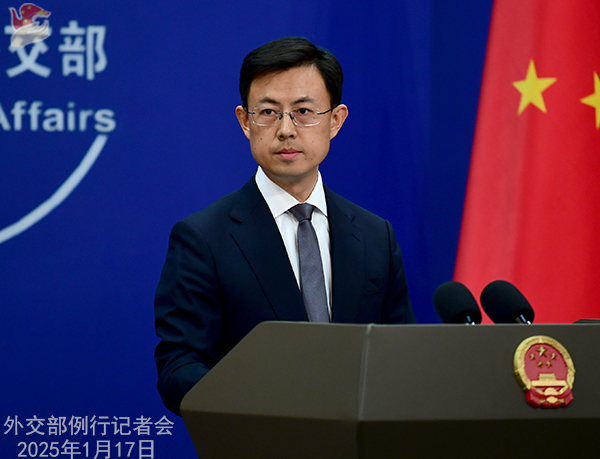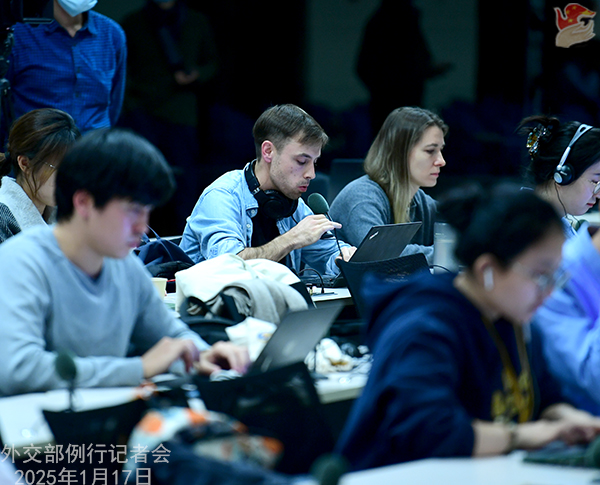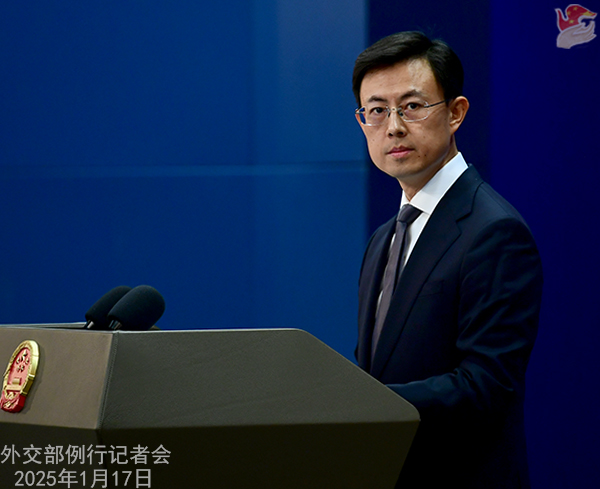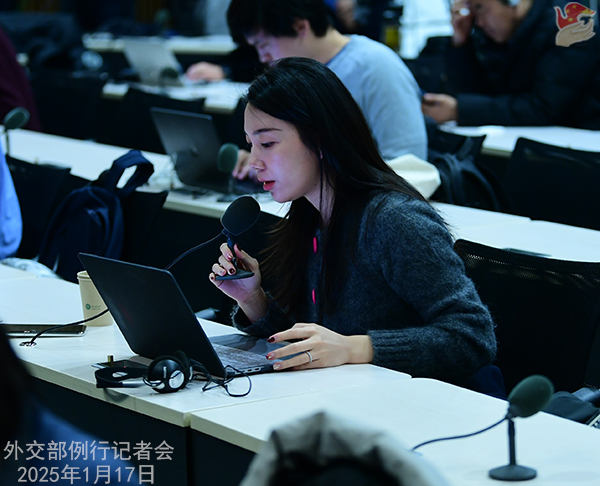
At the invitation of Klaus Schwab, Founder and Chairman of the Board of Trustees of the World Economic Forum, and the governments of Switzerland and the Netherlands, Member of the Standing Committee of the Political Bureau of the CPC Central Committee and Vice Premier Ding Xuexiang will attend the World Economic Forum Annual Meeting 2025 in Davos, Switzerland and visit Switzerland and the Netherlands from January 19 to 24.
At the invitation of Member of the Political Bureau of the CPC Central Committee and Minister of Foreign Affairs Wang Yi, Adviser for Foreign Affairs of the Interim Government of Bangladesh Touhid Hossain will visit China from January 20 to 24.
CCTV: You just announced that Vice Premier Ding Xuexiang will attend the World Economic Forum Annual Meeting 2025. Can you share with us more details on his program and China’s expectation for the meeting?
Guo Jiakun: World Economic Forum, known as a world economic bellwether, is one of the most influential non-official economic forums in the world. President Xi Jinping attended the forum for three times and delivered important remarks. He sent a strong message of supporting economic globalization, safeguarding and practicing multilateralism, and jointly creating a better world. Under the theme of “Collaboration for the Intelligent Age,” the meeting invites relevant parties to discuss how to enhance cooperation and jointly seize the opportunities for development in the intelligent age. Vice Premier Ding Xuexiang will deliver a special address at the opening plenary of the annual meeting.
By attending the annual meeting, China looks forward to strengthening exchanges and communication with other parties, enhancing understanding and trust, pooling consensus for cooperation, upholding true multilateralism, jointly advocating an equal and orderly multipolar world and a mutually beneficial and inclusive economic globalization, and contributing to improving global economic governance and boosting world economic growth.
Xinhua News Agency: It’s reported that many outcomes have been reached during Sri Lanka’s President Anura Kumara Dissanayake’s visit to China and the two sides issued a joint statement. Can you further brief us on that and how does China view the significance of the visit to China-Sri Lanka relations?
Guo Jiakun: At the invitation of President Xi Jinping, Sri Lankan President Anura Kumara Dissanayake paid a state visit to China from January 14 to 17. It was President Dissanayake’s first visit to China after taking office, and is of great importance to the development of China-Sri Lanka relations. On January 15, President Xi Jinping held talks with President Dissanayake. The two sides reached important common understandings on deepening China-Sri Lanka strategic cooperative partnership and jointly building a China-Sri Lanka community with a shared future, making new strategic guidance for the development of China-Sri Lanka relations. The two heads of state jointly witnessed the signing of the Belt and Road cooperation plan and multiple documents on bilateral cooperation, including the export of agricultural products to China, people’s livelihood, and news and broadcasting, among others. During the visit, Premier Li Qiang and Chairman Zhao Leji of the Standing Committee of the National People’s Congress met with President Dissanayake respectively. The two sides issued a joint statement that gives a full overview of what has been achieved through President Dissanayake’s visit.
China attaches high importance to its ties with Sri Lanka in the neighborhood diplomacy. China and Sri Lanka today have a historic opportunity to build on what has been achieved and take the relationship into the next chapter. China stands ready to work with Sri Lanka to follow up on the important common understandings reached between the two leaders, deepen our strategic cooperative partnership featuring sincere mutual assistance and ever-lasting friendship, work for high-quality Belt and Road cooperation, jointly build a China-Sri Lanka community with a shared future, and bring more benefit to our two countries and two peoples.
China News Service: To follow up on Adviser for Foreign Affairs of the Interim Government of Bangladesh Touhid Hossain’s official visit to China, what’s China’s comment on its current relations with Bangladesh and expectation of this visit?
Guo Jiakun: China and Bangladesh are traditional friendly neighbors. Since the establishment of diplomatic ties, both sides have treated each other with respect and as equals, and supported each other on issues concerning respective core interests. We have set a good example of friendly interaction and mutually beneficial cooperation among countries.
China, as always, attaches great importance to growing its relations with Bangladesh. The year 2025 marks the 50th anniversary of China-Bangladesh diplomatic ties and the “China-Bangladesh People-to-People Exchange Year.” China stands ready to work with Bangladesh to strengthen interactions at various levels, enhance political mutual trust, deepen high-quality Belt and Road cooperation and exchanges and cooperation in other fields, and advance the China-Bangladesh comprehensive strategic cooperative partnership.
AFP: Media reports in China yesterday said that the CEO of the Hong Kong-listed company Vanke had been taken away by public security authorities. Can the Ministry confirm this and if true provide any details on this?
Guo Jiakun: I’m not familiar with the specifics you mentioned and would refer you to competent authorities.

CRI: Could you share with us the arrangement for Vice Premier Ding Xuexiang’s visits to Switzerland and the Netherlands? What’s China’s comment on its current relations with Switzerland and the Netherlands and expectation of the visits?
Guo Jiakun: This year marks the 75th anniversary of China-Switzerland diplomatic ties. President Xi Jinping’s state visit to Switzerland in 2017, a full success, has brought bilateral relations to a new, historic height. During the visit to Switzerland, Vice Premier Ding Xuexiang will respectively have a meeting and talks with President of the Swiss Confederation and Head of the Federal Department of Finance Karin Keller-Sutter and Vice President of the Federal Council and Head of the Federal Department of Economic Affairs, Education and Research Guy Parmelin. They will have an exchange of views on bilateral relations, mutually beneficial cooperation in various fields, and international and regional issues. Through this visit, China looks forward to further implementing the important common understandings between the two leaders, working with Switzerland to start the celebration of the 75th anniversary of diplomatic ties, better enhancing political mutual trust, strengthening bilateral and multilateral cooperation, and working for higher quality and efficiency in the China-Switzerland innovative strategic partnership.
China and the Netherlands are major economies and trading powerhouses in the world. The Netherlands has long been a “gateway” to China-EU cooperation. In recent years, our open and practical comprehensive cooperative partnership has made steady progress, and exchanges and cooperation in various fields have produced fruitful results, which have benefited the two peoples. China looks forward to having an in-depth exchange of views with the Netherlands on bilateral relations and issues of mutual interest, enhancing mutual understanding and trust, unlocking the potential of cooperation, expanding people-to-people and cultural exchanges, and achieving new progress in China-Netherlands relations.
AFP: A US report yesterday said that China’s practices in the shipbuilding sector undermined fair competition and they wanted urgent action. Does the Ministry have a response to this report on shipbuilding?
Guo Jiakun: The spokesperson of China’s Ministry of Commerce has responded to that. Let me stress that the Biden administration’s Section 301 investigation against China targeting the maritime, logistics, and shipbuilding sectors seriously violates WTO rules and is purely protectionism. China strongly deplores and firmly opposes it, and has made clear our position more than once.
Various US studies show that the US shipbuilding industry lost its competitive advantage many years ago due to over-protection. The growth of relevant industries in China is a result of companies’ tech innovation and participation in market competition. It also benefits from China’s fully-fledged industrial manufacturing system and vast domestic market. The Biden administration blaming its own problems on China lacks factual basis and economic common sense. We urge the US to respect facts and multilateral rules, immediately stop its wrongdoings and return to the rules-based multilateral trading system. China will closely follow the investigation and take all measures necessary to firmly defend our rights and interests.
Beijing Daily: According to reports, on January 15, Kosovo police raided Serb-populated areas in the north of Kosovo, closed Serbian-run institutions and dispelled the employees. Serbian President Aleksandar Vučić condemned what the Kosovo authorities did. The US, the EU and France also expressed concerns over that, urging Kosovo to fulfill its obligation of establishing the Community of Serb Municipalities. Do you have any comment?
Guo Jiakun: On the Kosovo issue, China respects Serbia’s sovereignty and territorial integrity and believes that the security and lawful rights and interests of the Serbs in Kosovo should be safeguarded. Unilateral actions are not conducive to resolving the issue and will impact security and stability in the Kosovo region. We hope relevant parties will continue to engage in practical and constructive dialogue within the framework of relevant UN Security Council resolutions and actively seek a lasting solution to the Kosovo issue.

Reuters: I have a question about Chinese citizens trapped in Myanmar. Recently, their families have posted messages seeking for help on domestic social media platforms, including a shared document containing the information of thousands of people trapped. How does the Foreign Ministry view the posting for help from these families as well as cross-border telecom fraud and related human trafficking, kidnapping and abuse?
Guo Jiakun: In a meeting with diplomatic envoys from 10 ASEAN countries in Beijing on January 16, Member of the Political Bureau of the CPC Central Committee and Minister of Foreign Affairs Wang Yi said that a series of vicious cases of online gambling and telecom fraud along the Thailand-Myanmar border recently have threatened and harmed the vital interests of citizens of China and other countries, a situation that needs to be taken seriously. It is hoped that relevant countries will step up to their responsibility and take strong measures to resolutely crack down on these crimes, safeguard the safety of people’s life and property, and never allow criminals to go unpunished.
I’d like to stress that the Chinese government stands firm in combating crimes of telecom and online fraud, fighting cross-border illegal and criminal activities and protecting the lawful rights and interests of Chinese citizens. We also ask Chinese citizens overseas to strictly abide by local laws and regulations and refrain from engaging in any illegal and criminal activities.
In a recent period of time, China has worked closely with relevant countries to bust a large group of cross-border criminal gangs. China will continue to deepen international law-enforcement cooperation and take tougher steps to combat cross-border illegal and criminal activities including online gambling and telecom fraud and human trafficking.
We will continue to work in collaboration with competent authorities to guide our diplomatic missions to properly handle cases involving Chinese citizens overseas and provide necessary assistance to the individuals concerned and their families within our duty.
We also hope that our fellow Chinese will take extra safety precautions to protect themselves and join in our effort to end the scourge of online gambling and telecom fraud.
AFP: A privacy campaign group in Europe yesterday filed complaints against six Chinese companies, including WeChat and Temu. They said that these companies have violated EU data privacy laws. Does the Ministry have a response to this?
Guo Jiakun: The Chinese government attaches great importance to and protects in accordance with the law data privacy and security. We have never asked and will never ask any company or individual to collect or provide data, information or intelligence located abroad against local laws for the Chinese government. Relevant parties need to respect the principles of market economy and fair competition, and provide a fair, transparent and non-discriminatory environment for Chinese companies.
Shenzhen TV: We noted that the National Computer Network Emergency Response Technical Team/Coordination Center of China (CNCERT) released a report today, which included detailed information of the cyberattacks by US intelligence agency on a Chinese advanced materials design and research institution and a major Chinese high-tech company in the smart energy and digital information sector, and claimed this report served as a reference for countries and agencies around the world to effectively identify and guard against cyberattacks by the US. What’s your comment?
Guo Jiakun: We noted the report. This report by CNCERT brought to light again the attempts by the US government to conduct cyberattacks and theft of trade secrets and intellectual property targeting China. We express serious concerns about such attempts, and urge the US to immediately stop the malicious activities. China will take necessary measures to safeguard its own cyber security and interests.
Cyberspace bears on national security and economic prosperity of all countries. The US should reflect on what it’s doing, and stop its political smears. The US should live up to its standards first before asking other countries to do the same, responsibly observe the same international rules respected by other countries, and work with the international community to maintain peace and security in cyberspace.
